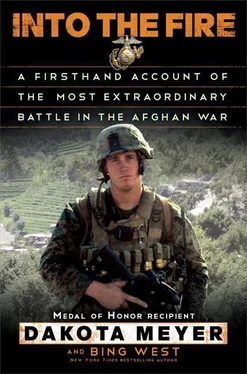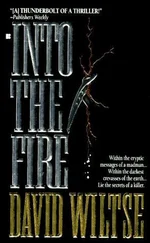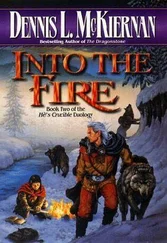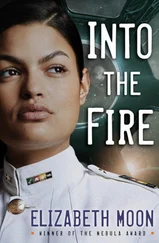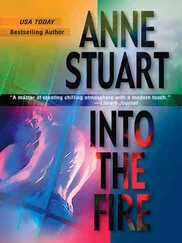He showed us the gym, the showers, the dining hall, and the Internet stations. Wherever you are these days, you can get satellite Internet and make live video calls back home, so there’s a lot of that. “So just make yourselves at home here, and use our maintenance guys if you have any vehicle issues. Don’t let things go too long, because these roads really eat up the vehicles.”
Well, I’m from Kentucky, and even by my high standards this was looking like a very friendly little town. Dog Company made us feel right at home.
Only in the smallest combat outposts do the Coalition and Afghan troops share the same bunk areas. Monti wasn’t that small, but the four of us who had just arrived were bunked on the Afghan side because we were there as advisors. That was fine with me. The sooner we settled in, the sooner we’d be outside the wire on combat patrols, which was where I wanted to be.
A few days later, Staff Sgt. Kenefick and I had finished shaving and were walking out of the head at COP Monti when we heard a few loud pops. We stood there, puzzled. Then there was a whoosh and a BANG! We dove into a nearby bunker, joined by Lt. Johnson and Doc Layton. Staff Sgt. Kenefick and I were wearing T-shirts and were armed with towels. So I sprinted to our hooch, grabbed my gear and a 240 machine gun, and ran back to the bunker.
“Meyer, you didn’t bring my gear!” Staff Sgt. Kenefick said.
Okay, I’m the junior man. I run back to the hooch and return with the sergeant’s gear. We sit inside the concrete shelter and listen to a few more pops followed by booms.
“I think they’re RPGs,” I say. “That means they have a direct line of sight on the camp. We should return fire.”
“Good idea,” Lt. Johnson says. “Go ahead.”
Without thinking, I run outside and see that the sentry post is empty. The sentry on guard has ducked into the bunker. I anchor the 240 on the sandbags inside his post and scan a steep hill to the southeast. About six hundred meters away, I spot a lone dushman, RPG slung on his back, scrambling up the hill. (The Afghan soldiers referred to all Taliban as dushmen, meaning thugs and bandits.) He’s a ballsy guy. He walked downslope, took three or four shots in the wide open, and is now heading back up the ridge.
I aim the gun. I’m a sniper; shooting is technique. No emotion.
Sometimes you do think about it. That tiny figure in the distance is a human being. He may be a great guy, or he may be one of those animals who will beat his sister to death for having a boyfriend not arranged by the family. You are not there to judge. My only job is to bring him down before he gets to cover.
I fire burst after burst, walking the tracers up the slope. I hit his legs first, then his back. I keep shooting until I’m tearing up a corpse. I rip through two hundred rounds. The sound of the last rounds echoes down the valleys with no return fire. That RPG gunner died alone. No riflemen were providing cover for him. I wondered if he was dumb, or if he had gotten away with it before. I trotted back to the bunker.
“Why didn’t you guys bring me more ammo?” I said.
“Sounded like you were doing all right,” Staff Sgt. Kenefick said. “We didn’t want to interfere with a tactical genius at work.”
In the dim light of the bunker, I couldn’t see their expressions. But I knew Lt. Johnson, Staff Sgt. Kenefick, and Doc Layton were all grinning.
“That’s what you’re here for, Meyer,” Lt. Johnson said. “You’re the sniper. You’re our bodyguard.”
“Like Kevin Costner,” Doc Layton said, drawling out each syllable.
“An ug- ly Kevin Costner,” Staff Sgt. Kenefick added.
The lieutenant popped out of the bunker and slapped me good-naturedly on the back. “You’re our man, Meyer,” he laughed. “We all feel safer with you on the job.”
I could take the roasting.
I’d put in four years’ training for this role. No, more like twenty-one years. My dad thought I was too impatient to develop into a first-class hunter. He hadn’t figured on the U.S. Marine Corps providing me with a machine gun and a two-hundred-round belt of ammunition.
That night, I hit my bunk early inside the hooch. It can get a little smelly in there, but an air-conditioning unit kept it cool when the electricity was working. Though I’m no philosopher, I knew the Indus River was somewhere on the other side of these mountains. In the Hindu holy book, there’s a story of a warrior who hesitates to attack because his relatives are in the other army. A Hindu god tells him not to hesitate. His role in today’s life is to fight fiercely. Let the gods sort out what happens in the next life. I was down with that.
“That was good shooting, cowboy,” Lt. Johnson said as we all quieted down in the dark.
“He’s not a cowboy, Lieutenant; he’s from Kentucky,” Staff Sgt. Kenefick corrected.
“I am a cowboy,” I said. “I grew up with cows.”
“Yeah, but did you ride a horse?” asked Staff Sgt. Kenefick.
“That would make me a horse boy. I rode a cow.”
They laughed. But it was the truth. They didn’t know anything about life on a farm.
Chapter 1
FINISH THE GAME
“I hope to have God on my side,” President Lincoln wrote in 1862, regarding the Union’s chances for victory in the Civil War, “but I must have Kentucky.”
That independence of spirit that you might call the nation’s soul is alive and well in the farming communities of central Kentucky.
My tiny town of Columbia might be considered poor by some standards. We don’t look at it like that. We enjoy being on our own, making do with what we scratch out for ourselves. The land is the reason people stay, generation after generation. If you drive through Columbia, you’ll see modest homes and trailers on slab foundations, set near the road. Fields stretch out where cattle and horses graze. Nowadays, farming provides only a supplemental income for most families. Commutes of twenty to sixty miles are common to hold down day jobs. But the land keeps people returning to their homes at the end of the workday—this feeling of space that comes with owning the acres outside your back door.
I’m not saying it’s always wonderful. My home life growing up was like tumbling inside a washing machine as I shuttled around the middle of Kentucky with my mother. She was never content to stay in one place, or with one man, for too long. She was as smart as she was independent, though, and always landed some job that brought in a little money.
Summers provided stability because my mother let me stay for weeks at Mike Meyer’s farm. Mike was briefly married to my mother, and he legally adopted me when I was born. As for my biological father, I had no contact with him. I learned early on that just because you come from the same blood as someone doesn’t mean they are family. Big Mike Meyer was my real dad as far as I was concerned.
Big Mike, a University of Kentucky graduate, owned a three-hundred-acre farm in Greensburg. He worked for Southern States, a farmer-owned cooperative, and brought in extra cash by raising beef cows. He lived in a plain house surrounded by open fields, with no curtains on the windows or pictures on the walls. He came home each day, put on his overalls, and tended to chores. Big Mike liked a steady routine, hunting, and the satisfaction of a well-run farm.
His dad, Dwight, owned a bigger farm on the other side of the creek. Dwight had served in the Marines and had later been an engineer. He held himself and others to rigid standards, as if he could see the proper ways of living by looking through his surveyor’s scope. He was, and still is, a fair but hard-to-please man. Despite my falling short fairly often, he always seemed to think I was someone worth having in the family. If you can feel that from your family, nothing can touch you.
Читать дальше
